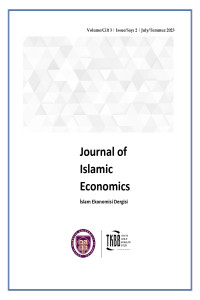Ali Muhyiddîn el-Karadâğî. Theory of Contract in Islamic Economics. Transl. Abdullah Kahraman (Book Review, Nida Publication, İstanbul, 2021, 295 p.)
Abstract
Law and economics are two important disciplines in Social Sciences. Although these two sciences have a different structure from each other, they also have common areas of study. The law of obligations, which is included in private law, is a framework and/or basic field for economics. The same is true for Islamic law of obligations and Islamic economics. Economic-financial transactions and systems in Islam were organized and developed on the basis of the science of fiqh. To date, many works have been written on this subject. In this sense, Ali Muhyiddin al-Karadağı's Islamic Economics Contract Theory is one of the works written in this field and filling an important gap.
References
- El-Karadâğî, Ali Muhyiddîn. 2021. İslâm İktisâdı Akit Teorisi. 1st ed. İstanbul: Nida Publication.
Abstract
References
- El-Karadâğî, Ali Muhyiddîn. 2021. İslâm İktisâdı Akit Teorisi. 1st ed. İstanbul: Nida Publication.
Abstract
References
- El-Karadâğî, Ali Muhyiddîn. 2021. İslâm İktisâdı Akit Teorisi. 1st ed. İstanbul: Nida Publication.
Ali Muhyiddîn el-Karadâğî. İslâm İktisâdı Akit Teorisi. Çev. Abdullah Kahraman (Kitap Değerlendirmesi, Nida Yayıncılık, İstanbul, 2021, 295 s.)
Abstract
Sosyal Bilimler içerisinde hukuk ve iktisat önemli iki ayrı bilim dalı olarak karşımıza çıkmaktadır. Bu iki bilim, birbirinden farklı bir yapı arz etse de ortak çalışma alanları da bulunmaktadır. Özel hukukun içerisinde yer alan borçlar hukuku, İktisat bilimi için çatı ve/veya temel alan mahiyetindedir. İslâm borçlar hukuku ve İslâm iktisadı alanları için de aynı durum söz konusudur. İslâm’da iktisadî-malî işlemler ve sistemler, fıkıh ilmi temelinde düzenlenmiş ve geliştirilmiştir. Bugüne kadar bu hususta pek çok eser kaleme alınmıştır. Bu anlamda Ali Muhyiddîn el-Karadâğî’nin İslâm İktisâdı Akit Teorisi bu alanda kaleme alınan ve önemli bir boşluğu dolduran eserlerden biridir.
Thanks
Desteklerinden ötürü değerli hocam Mahmut Samar'a kalpten teşekkürler
References
- El-Karadâğî, Ali Muhyiddîn. 2021. İslâm İktisâdı Akit Teorisi. 1st ed. İstanbul: Nida Publication.
Details
| Primary Language | Turkish |
|---|---|
| Subjects | Economics |
| Journal Section | Book Review |
| Authors | |
| Early Pub Date | June 22, 2023 |
| Publication Date | July 15, 2023 |
| Submission Date | December 28, 2022 |
| Published in Issue | Year 2023 Volume: 3 Issue: 2 |
Journal of Islamic Economics is licensed under a Creative Commons Attribution-NonCommercial 4.0 International License (CC BY NC).

